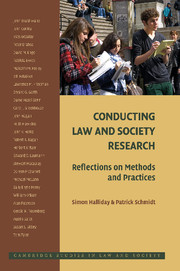Book contents
- Frontmatter
- Contents
- List of Contributors
- Acknowledgments
- 1 Introduction: Beyond Methods – Law and Society in Action
- 2 Stewart Macaulay and “Non-Contractual Relations in Business”
- 3 Robert Kagan and Regulatory Justice
- 4 Malcolm Feeley and The Process Is the Punishment
- 5 Lawrence Friedman and The Roots of Justice
- 6 John Heinz and Edward Laumann and Chicago Lawyers
- 7 Alan Paterson and The Law Lords
- 8 David Engel and “The Oven Bird's Song”
- 9 Keith Hawkins and Environment and Enforcement
- 10 Carol Greenhouse and Praying for Justice
- 11 John Conley and William O'Barr and Rules versus Relationships
- 12 Sally Engle Merry and Getting Justice and Getting Even
- 13 Tom Tyler and Why People Obey the Law
- 14 Doreen McBarnet and “Whiter than White Collar Crime”
- 15 Gerald Rosenberg and The Hollow Hope
- 16 Michael McCann and Rights at Work
- 17 Austin Sarat and William Felstiner and Divorce Lawyers and Their Clients
- 18 Yves Dezalay and Bryant Garth and Dealing in Virtue
- 19 Patricia Ewick and Susan Silbey and The Common Place of Law
- 20 Hazel Genn and Paths to Justice
- 21 John Braithwaite and Peter Drahos and Global Business Regulation
- 22 John Hagan and Justice in the Balkans
- 23 Conclusion: “Research Is a Messy Business” – An Archeology of the Craft of Sociolegal Research
- Index
- Cambridge Studies in Social and Cultural Anthropology
21 - John Braithwaite and Peter Drahos and Global Business Regulation
Published online by Cambridge University Press: 09 February 2010
- Frontmatter
- Contents
- List of Contributors
- Acknowledgments
- 1 Introduction: Beyond Methods – Law and Society in Action
- 2 Stewart Macaulay and “Non-Contractual Relations in Business”
- 3 Robert Kagan and Regulatory Justice
- 4 Malcolm Feeley and The Process Is the Punishment
- 5 Lawrence Friedman and The Roots of Justice
- 6 John Heinz and Edward Laumann and Chicago Lawyers
- 7 Alan Paterson and The Law Lords
- 8 David Engel and “The Oven Bird's Song”
- 9 Keith Hawkins and Environment and Enforcement
- 10 Carol Greenhouse and Praying for Justice
- 11 John Conley and William O'Barr and Rules versus Relationships
- 12 Sally Engle Merry and Getting Justice and Getting Even
- 13 Tom Tyler and Why People Obey the Law
- 14 Doreen McBarnet and “Whiter than White Collar Crime”
- 15 Gerald Rosenberg and The Hollow Hope
- 16 Michael McCann and Rights at Work
- 17 Austin Sarat and William Felstiner and Divorce Lawyers and Their Clients
- 18 Yves Dezalay and Bryant Garth and Dealing in Virtue
- 19 Patricia Ewick and Susan Silbey and The Common Place of Law
- 20 Hazel Genn and Paths to Justice
- 21 John Braithwaite and Peter Drahos and Global Business Regulation
- 22 John Hagan and Justice in the Balkans
- 23 Conclusion: “Research Is a Messy Business” – An Archeology of the Craft of Sociolegal Research
- Index
- Cambridge Studies in Social and Cultural Anthropology
Summary
Perhaps the greatest frontier for the study of law in society is the global. The production and maintenance of “law” in its global dimensions has generated new forms of interaction, interdependence, and international institution building. Students and scholars seeking fodder for exciting new projects are drawn to a topic as ripe and intriguing as globalization. History reminds us, however, that excursions into frontiers are frequently difficult and dangerous. Here the challenges are not of life and limb, of course, but of resources and intellectual energy. Are you able to locate all of the pieces of the puzzle that contribute to the “global” pattern? Can you find the time and money necessary to get you where you need to go? Then, can you bring theoretical meaning or order out of an evolving and complicated mess of interaction?
While studying even a single field or institution poses challenges enough (see, respectively, Dezalay and Garth, Chapter 18, and John Hagan, Chapter 22), what must empirically minded scholars do to capture a portrait of globalization processes across many substantive areas? Some of the answer provided by John Braithwaite and Peter Drahos in their monumental volume, Global Business Regulation, deserves a mixture of respect, appreciation, and trepidation: ten years, over five hundred interviews, and a final text 629 pages in length. Yet, in other respects, their experience provides some reassurances. English was nearly universal, for example, and much of the story of globalization remained concentrated in relatively few places – the power centers of the United States and Europe. As they explore in this interview, the perpetual issue of access may have been made easier by their world travel.
- Type
- Chapter
- Information
- Conducting Law and Society ResearchReflections on Methods and Practices, pp. 240 - 251Publisher: Cambridge University PressPrint publication year: 2009



